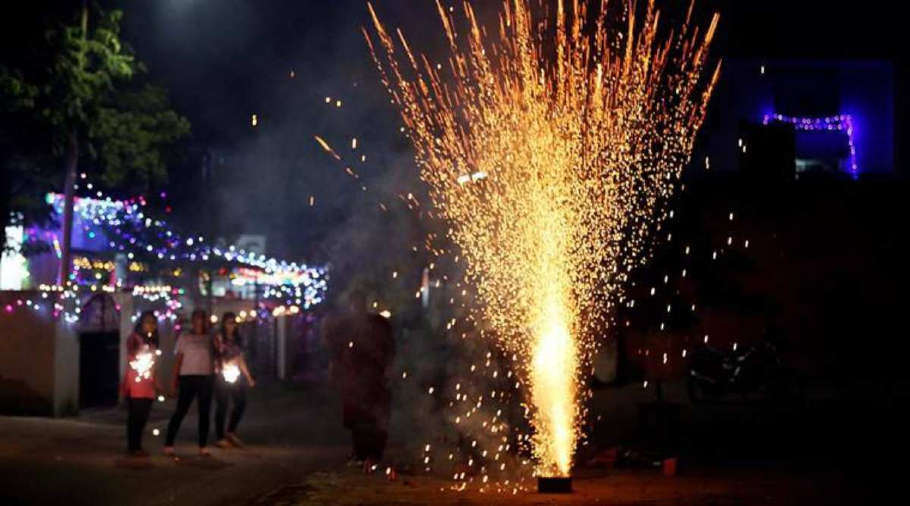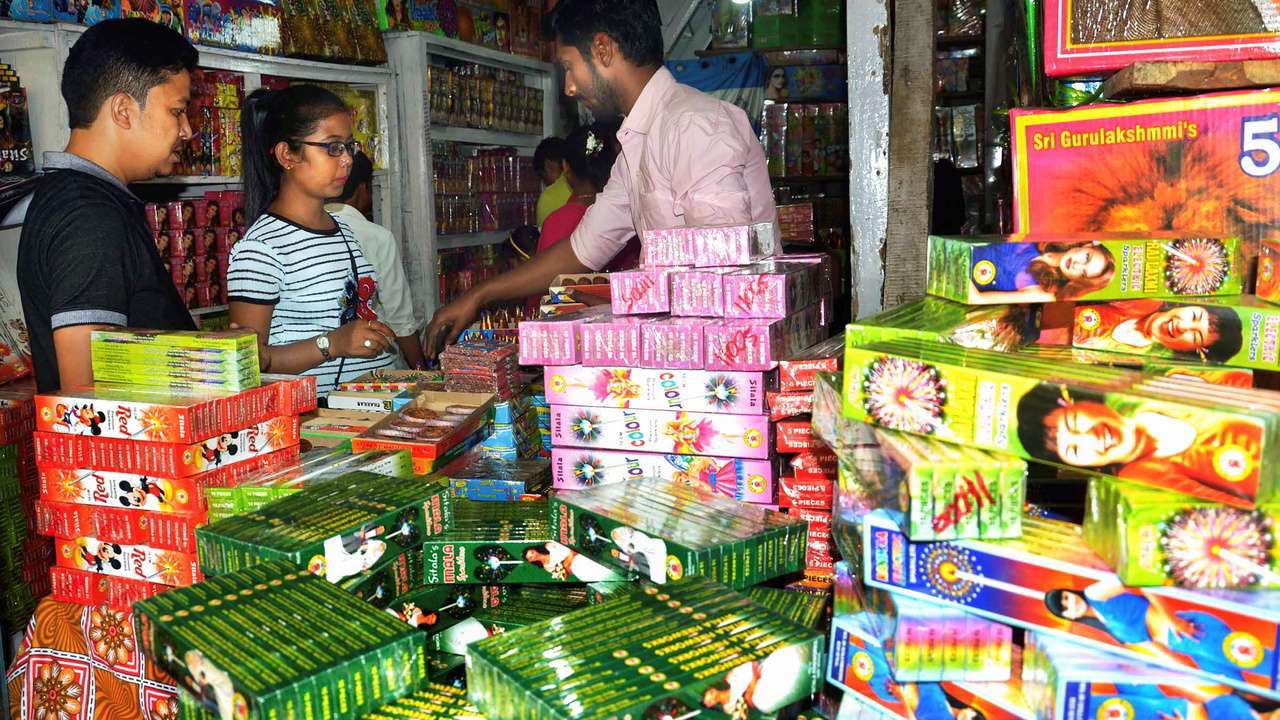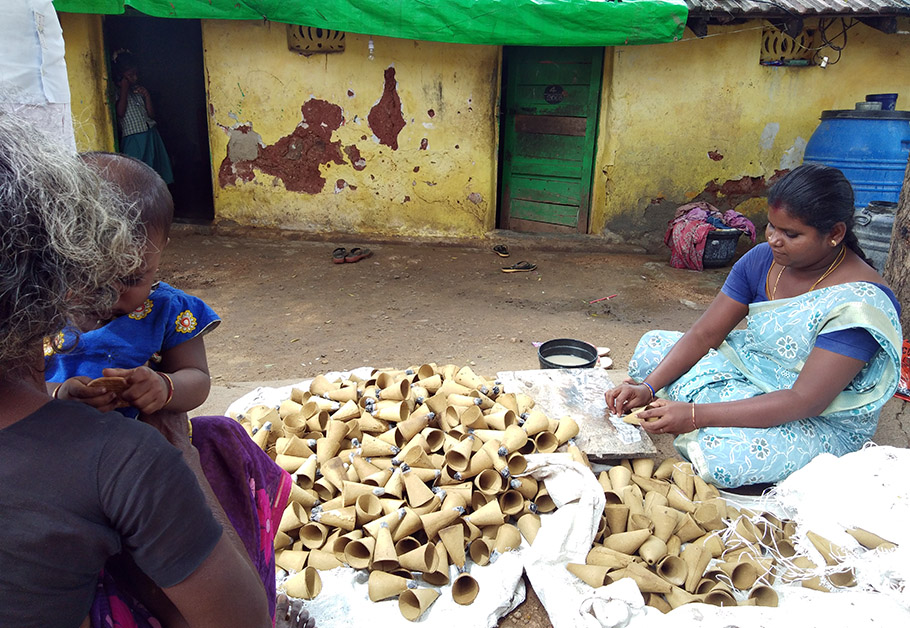
- Home
- News
- Analysis
- States
- Perspective
- Videos
- Education
- Entertainment
- Elections
- World Cup 2023
- Features
- Health
- Business
- Series
- Economy Series
- Earth Day
- Kashmir’s Frozen Turbulence
- India@75
- The legend of Ramjanmabhoomi
- Liberalisation@30
- How to tame a dragon
- Celebrating biodiversity
- Farm Matters
- 50 days of solitude
- Bringing Migrants Home
- Budget 2020
- Jharkhand Votes
- The Federal Investigates
- The Federal Impact
- Vanishing Sand
- Gandhi @ 150
- Andhra Today
- Field report
- Operation Gulmarg
- Pandemic @1 Mn in India
- The Federal Year-End
- The Zero Year
- Premium
- Science
- Brand studio
- Home
- NewsNews
- Analysis
- StatesStates
- PerspectivePerspective
- VideosVideos
- Entertainment
- ElectionsElections
- Sports
- Loading...
Sports - Features
- BusinessBusiness
- Premium
- Loading...
Premium

Diwali: Annual chaos over crackers isn’t enough to tackle the toxic air
As millions of others across the National Capital Region (NCR) wait to light up the night sky in Diwali, blowing to bits all concerns over the severely poor air quality, the annual chaos over ban on crackers has only become shriller.

It’s a nippy Tuesday in Uttar Pradesh’s Noida. The air purifier inside homes shows the AQI (Air Quality Index) crossing the 600-mark. As a thick layer of smog hovers over the horizon and a musty smell engulfs the air, a group of young boys in a multi-towered gated community break the afternoon stillness with a loud noise and cheering. For the next 15 minutes, they continue...
It’s a nippy Tuesday in Uttar Pradesh’s Noida. The air purifier inside homes shows the AQI (Air Quality Index) crossing the 600-mark. As a thick layer of smog hovers over the horizon and a musty smell engulfs the air, a group of young boys in a multi-towered gated community break the afternoon stillness with a loud noise and cheering. For the next 15 minutes, they continue bursting crackers. All of this, however, is just a warm-up to the main event they are gearing for — Diwali — the festival of lights and sounds.
As millions of others across the National Capital Region (NCR) wait to light up the night sky in Diwali, blowing to bits all concerns over the severely poor air quality, the annual chaos over ban on crackers has only become shriller.
Led by Rajasthan, Delhi, Odisha, Haryana, West Bengal, Karnataka and some northeastern states have imposed complete or partial bans on firecrackers. The National Green Tribunal (NGT), the apex environmental court, has gone a step further and barred sale and use of firecrackers between November 10 and 30 in all cities and towns across the country where the average ambient air quality in November fell under the ‘poor’ and above category.
Besides the annual affair with smog already at its peak — especially in landlocked northern cities where industrial and vehicular pollution is aggravated by crop stubble burning — this year, states are also dealing with the widespread COVID-19 disease.
To make things worse, the number of COVID cases has spiked in recent days. While many states are registering around 2,000-5,000 cases on a daily basis, Delhi has been recording around 7,000 cases every day for the last few days.
Interestingly in Punjab, which ends up burning more stubble than most states, there is no ban on crackers in the state. Maharashtra, which has the highest number of COVID cases in the country, too has refused to impose a blanket ban, and Chief Minister Uddhav Thackeray has appealed for self-restraint. Karnataka, though, has allowed green crackers, which are said to be less polluting.
Fireworks industry unhappy
For the Sivakasi-based fireworks industry, the ban has come as a double whammy. After months of lockdown, the cracker manufacturing units had revived production hoping to make up for the losses with Diwali and other festivals.
While acknowledging the COVID threat, the Tamil Nadu Fireworks and Amorces Manufacturers Association (TANFAMA) says it has, on the other hand, put the livelihoods of nearly 8 lakh workers in cracker manufacturing units in a fix as the district, Virudhunagar, accounts for nearly 95 percent of the fireworks manufacturing in the country.

But many say it is a hogwash that governments do every Diwali.
“The governments ban crackers only during Diwali. Is it okay if crackers are burst on other days?” asks P Ganeshan, TANFAMA president.
He though admits that crackers are sold in huge quantities only during Diwali. “But other than that, there is a demand for crackers, even if in lower quantities, during political events like elections, or the wedding season, or film releases,” he says.
Anumita Roychowdhury, executive director, Centre for Science and Environment (CSE), rebuts his theory saying that states are taking actions on all fronts to reduce pollution, and banning crackers is not a one-off thing.
“For instance, take Delhi. It has temporarily shut down all coal power plants, something that has not been done in any other city. All public transport runs on natural gas (or electricity, Metro). Diesel vehicles more than 10 years old are not allowed to run. Truck movement in the city is restricted. The banning of crackers is just another action in this regard,” she says, adding that governments must still come up with a long-term solution.
However, many feel that such advocacy by environment and health activists is a ‘conspiracy’ to destroy the economy of Tamil Nadu.
North-south divide
While Delhi and neighbouring states battle severe levels of pollution, Tamil Nadu and other states in the south enjoy relatively cleaner air. Seeing that southern states haven’t imposed any blanket ban. This has further given rise to talks of another kind of north-south divide, or more specifically Tamil Nadu versus northern states.
“North India, unlike Tamil Nadu, is landlocked. There is no advantage of the sea breeze. So, the particulate matter gets trapped and pollution reaches from severe to hazardous levels at this point of time. Yes, the pollution is the result of stubble burning, industrial activities, vehicular movement, etc. With such conditions prevailing, bursting crackers during Diwali increases pollution to extreme levels even though it is an episodic source of pollution,” explains Roychowdhury.
V Selvarajan, founder, Green Circle, a Delhi-based NGO working towards better environment, says bursting of crackers is bad for everyone, but unfortunately, the south Indian states haven’t understood that.
“Most northern states lie in low-lying areas since they are located in the Gangetic plains. So, the smog stays for a longer period because of the lack of air movement. But people in south India still have the luxury to remain unaware about the dangers of pollution because of the air movement and the existence of Western Ghats,” he says.

On normal days, the Air Quality Index (AQI) of Delhi is anywhere between 300 and 400. In Diwali times, it crosses 500 range, he notes.
“In north India, we have ‘Graded Response Action Plan’ (GRAP) to monitor the air quality and take actions such as shutting schools and odd-even road rationing, etc. But the people of south India don’t even know what AQI is. The air quality is not monitored properly there,” Selvarajan claims.
In 2017, the Centre brought out a state-level Disease Burden Initiative report for the period between 1990 and 2016. A relook at the report shows air pollution has moved up the rank as a major killer in nearly all states and the diseases directly affected by air pollution like ischemic heart disease and chronic respiratory ailments are the top killers, a report by the Centre for Science and Environment (CSE) said.
“Relative rank of air pollution as a risk factor has gone up in Arunachal Pradesh, Assam, Bihar, Chattisgarh, Haryana, Himachal Pradesh, Odisha, Rajasthan and Uttar Pradesh. In Delhi, Maharashtra, West Bengal is slightly lowered. But diseases that include cardiovascular diseases, chronic respiratory diseases, and cancers have increased substantially. In Delhi COPD has moved from rank 13 to rank 3; Ischemic heart disease gone up from rank 5 to number 1 etc. This makes the city extremely vulnerable to air pollution,” CSE said in another press statement released in 2017.
Interestingly, none of the southern states were found in the list of states where the air pollution risk has gone up.
Amid the rising concerns, proponents of fireworks offer green crackers as a solution.
Why not allow green crackers?
Fireworks proponents argue that following the Supreme Court order in 2018, they have now started creating green crackers as developed by National Environmental and Engineering Research Institute (NEERI), a lab under the Centre’s Council of Scientific and Industrial Research (CSIR).
These crackers are said to emit up to 30 per cent less particulate than the normal crackers. And many fireworks manufacturers have tied up with CSIR-NEERI to manufacture these for Diwali.
However, environmentalists allege that some units are using harmful Barium Nitrate in place of Sulphur. Barium nitrate was banned by the Supreme Court in 2018 following a public interest litigation arguing that it emits “poisonous” fumes.
“The allegations made by the environmentalists show that they don’t understand the manufacturing process of crackers,” says Ganeshan. “Sulphur is used as a fuel and Barium Nitrate is used as oxidising agents. Across the world, Sulphur is used in fireworks. Earlier, we used these two chemicals at a higher proportion, but after the SC order, we make limited use.”
The apex court has banned the use of chemicals such as antimony, lead, lithium, arsenic and mercury in crackers.

Ganeshan says all these chemicals are found only in imported crackers. “These are not used here (in their manufacturing units). The formulations we use are recommended by CSIR-NEERI and approved by the Central Pollution Control Board (CPCB) and the Ministry of Environment, Forest and Climate Change.”
Although green crackers are said to emit less pollution, it must be understood that we are still burning chemicals, Chowdhury says.
“People also claim that bursting crackers within a particular time frame will reduce smoke levels and there will be no problem since it disappears. But they must know that the chemicals from crackers will settle in the environment in different ways. It increases the toxicity of the environment and it will end up in our food chain,” she says.
M Geo Damin, an environmental activist says having a ‘permissible limit’ for use of hazardous chemicals is just ridiculous.
“You know sulphur is hazardous. Can the hazardous have any permissible limit? People are attracted to crackers because of the light and noise they emit. If green crackers don’t provide the expected amount of light and noise, they go for ordinary crackers,” he says, negating the benefits of green crackers.
Moreover, a government official says, while branded companies manufacture green crackers as per SC guidelines, it is the small cracker units that violate many rules and manufacture ordinary crackers.
“So whenever accidents happen in these smaller units, it brings a bad name to branded companies too,” the official says on condition of anonymity.
Alternative livelihood
Either way, it is the workers in cracker manufacturing units who are facing a threat to both their lives and livelihood.
A small cracker unit needs to have separate rooms for explosives and non-explosives. Only five rooms for explosives are allowed in a small cracker unit. The rooms for explosives should have exit ways on all four sides of the building. There must be water tanks near exit points. The labourers must immerse their legs in the water tank before entering the room. There should be no stock of finished products piled up there. There should be no electricity and the unit should not run after 4 pm.
“But all these rules are violated in many small units,” says a worker who doesn’t want to be named.
On the employment of child labourers, he says it has been brought down considerably now. “Nowadays, it is only the parents who work in the units while the children go to schools.”
“But during holidays, we cannot leave the girls alone at home. So, we used to bring them along and they would help us in packing or pasting labels on crackers, adding to the overall income,” he says.

Activists have argued that the government needs to help find alternative livelihood solutions, but Ganeshan questions the logic behind this.
“Environmental activists always talk about alternative livelihood. Who are they to say that the people here should look for alternative livelihood? Or what kind of alternative livelihood would they bring?”
Agriculture as an alternative offers little respite as farmers here grow only rainfed crops.
“This region receives limited rains. We cultivate crops such as sorghum and millets such as pearl millets and Japanese millets,” says Manikandan, a farmer.
Britto, founder of Vaan Muhil, a Virudhunagar-based NGO working towards eradicating child labour, says since the region is arid, the opportunity for alternative livelihood is very limited.
“The region is filled with Prosopis Juliflora trees, because of which, the water table has gone down. However, the soil here is fertile. The government can take steps to carry research here and recommend suitable crops,” he says.
“The state-run cement factory here which gave employment opportunities for many is now on the brink of closure due to lack of modernisation. Such kind of labour intensive industries must be developed here as an alternative,” he says.
Besides fireworks, Virudhunagar is also famous for its printing industry. However, demonetisation and GST dealt a big blow to it.
“Adding salt to the injury, the pandemic has heavily hit the industry. But the industry has a good future, given the government takes steps to modernise and support it on par with Singapore and Japan,” adds Britto.
“Only when cracker manufacturing units update their technology, the manual work will come down and the people who depend on cracker units for livelihood will automatically search for other alternative livelihoods,” says Sahitya Akademi award winning writer Cho Dharman, who worked in cracker units in his youth. His book, Nasukkam, published in 1992 was based on fire accidents in cracker units.
The nearly-a-century-old cracker manufacturing industry in Sivakasi has undergone several changes over the years. Notwithstanding the constant competition from China, the repeated bans during Diwali has affected the industry and the livelihoods of 8 lakh people.
“Only a ban on crackers during Diwali is certainly not the solution,” he adds.

